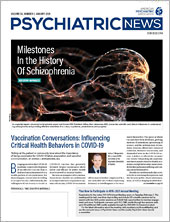Pregnant women who have anxiety may be at increased risk for hypertensive disorders of pregnancy such as gestational hypertension, preeclampsia, and eclampsia, suggests a study in the Journal of Affective Disorders.
“Mental health screening should be considered in the first trimester of the pregnancy if it is to be used prospectively to prevent hypertensive disorders of pregnancy and mental health disorders in the postpartum period,” study researcher Tuong-Vi Nguyen, M.D., M.Sc., told Psychiatric News. She is an assistant professor and a reproductive psychiatrist at McGill University in Montreal.
The researchers analyzed data from a population-based retrospective study involving nearly 9.1 million pregnant women using Healthcare Cost and Utilization Project Nationwide Inpatient Sample (HCUP-NIS) data from 2004 through 2014. This database samples 20% of all discharges from community hospitals in the United States except for long-term care and rehabilitation facilities. For their analysis, the researchers used ICD-9 codes for gestational hypertension, preeclampsia, and eclampsia and categorized mental disorders as bipolar disorder, depression, mood disorder, and anxiety disorder as well as mental disorders of mother, antepartum condition, or complication.
Pregnant women who had anxiety had a 32% greater risk of gestational hypertension, a 52% greater risk of preeclampsia, and an 81% greater risk of eclampsia compared with pregnant women who did not have anxiety. The rate of pregnant women with anxiety disorder and gestational hypertension increased from 1.75 per 10,000 women in 2004 to 12.99 per 10,000 women by 2014. At the same time, the rate of pregnant women with anxiety and preeclampsia increased from 2.21 to 12.85 per 10,000 women.
“In the past decade people have become more aware of and open about mental health problems, so I personally expected to see an increasing trend,” said senior author Eva Suarthana, M.D., Ph.D., an adjunct professor in the Obstetrics and Gynecology Department at McGill University and a researcher at McGill University Health Center in Montreal. “Nevertheless, I was still surprised to see such a remarkable increase and thought that health care professionals need to do something about this concerning trend.”
The researchers found that having depression did not consistently increase the risk of hypertensive disorders in pregnancy. Pregnant women with depression had a 15.6% greater risk of gestational hypertension and a 25.5% greater risk of preeclampsia than those who did not have depression, but they did not appear to have an increased risk of eclampsia.
Jennifer Payne, M.D., an associate professor of psychiatry and behavioral sciences and the director of the Women’s Mood Disorders Center at Johns Hopkins Medicine, said there is no harm in psychiatrists screening their pregnant patients who have anxiety for hypertension.
“Technically, the patients’ OB-GYNs are screening them regularly, [but] it never hurts to have more screening, particularly if a psychiatrist is prescribing a medication that can raise blood pressure,” said Payne, who was not involved in the research.
Payne emphasized the importance of psychiatric treatment in this population.
“In general the literature currently supports actively treating pregnant women with psychiatric disorders, including anxiety, to wellness. Untreated psychiatric disorders are not benign in pregnancy,” Payne said.
This study was supported in part by the Academic Enrichment Fund of the Department of Obstetrics and Gynecology at McGill University. ■



